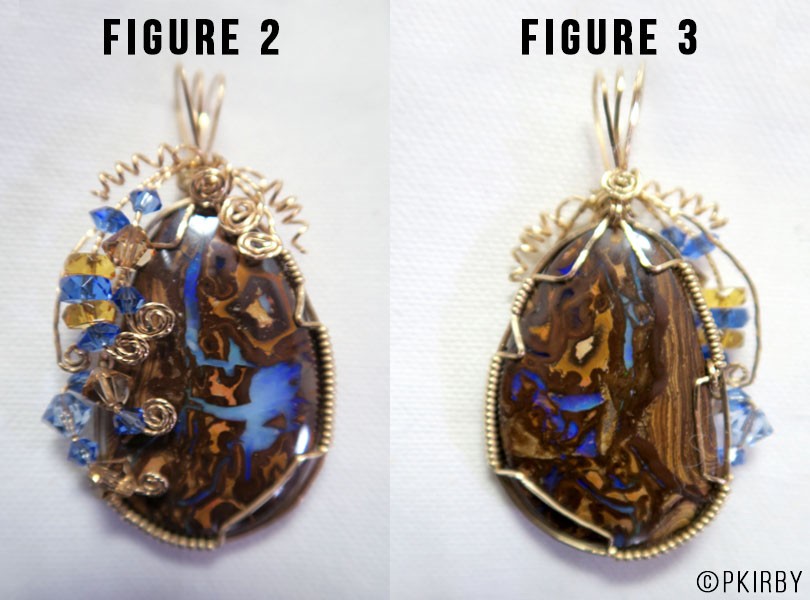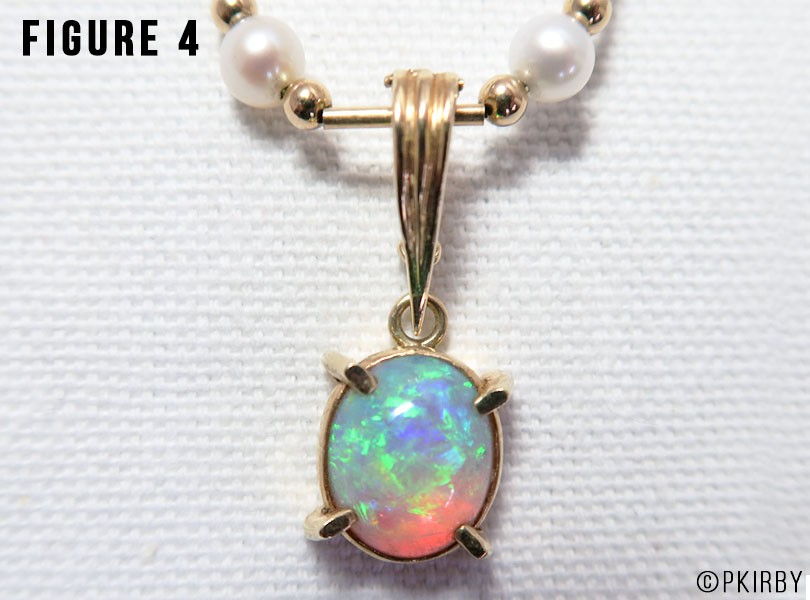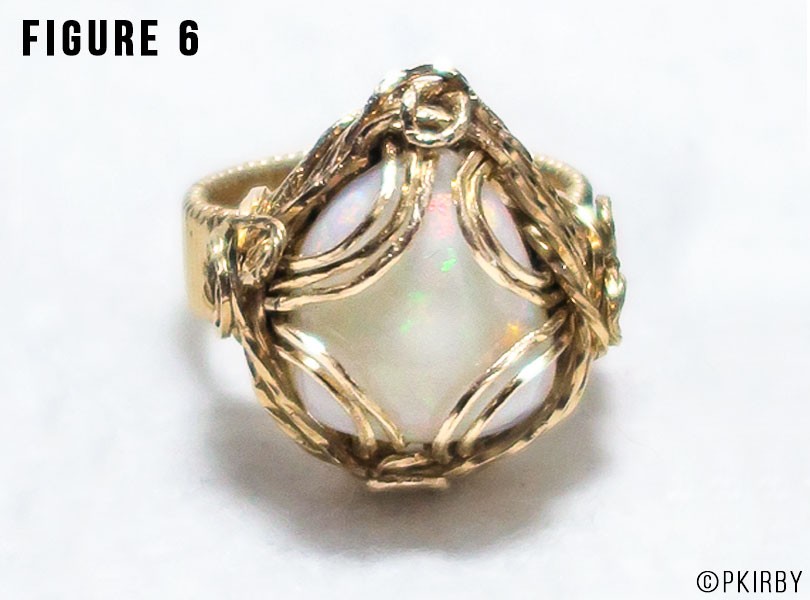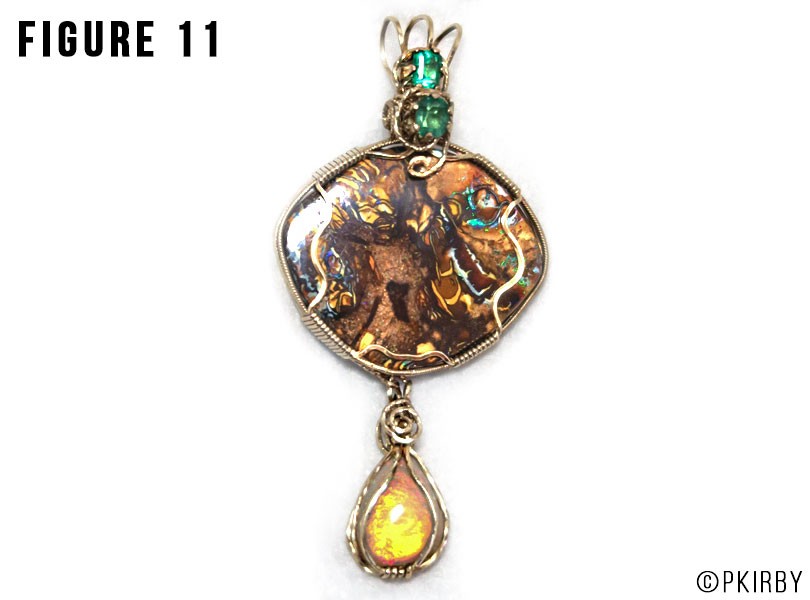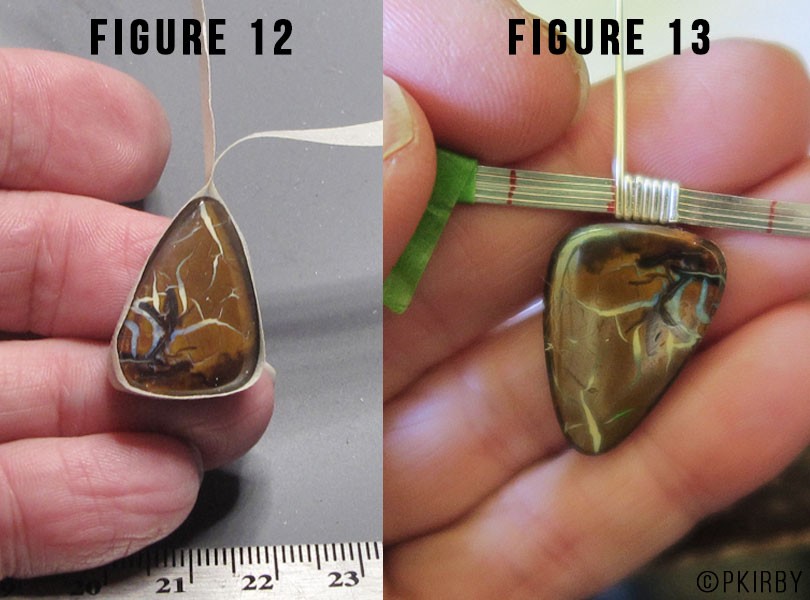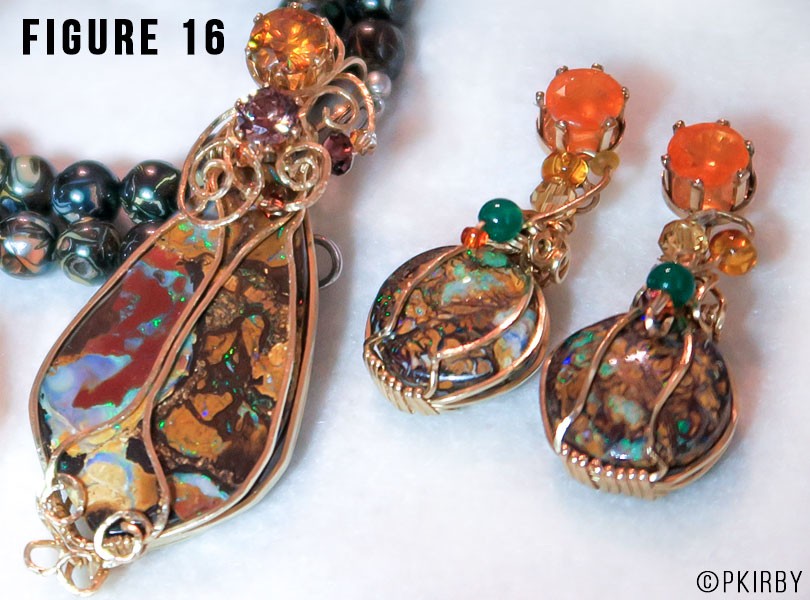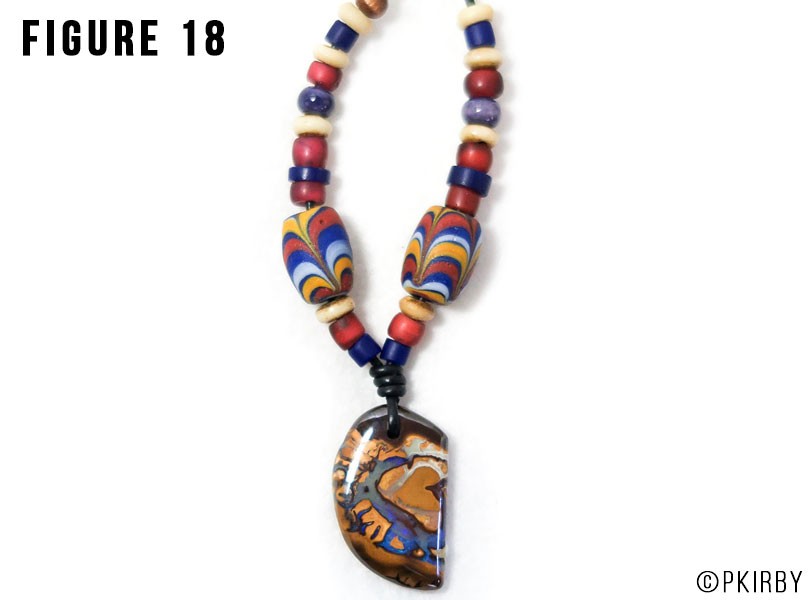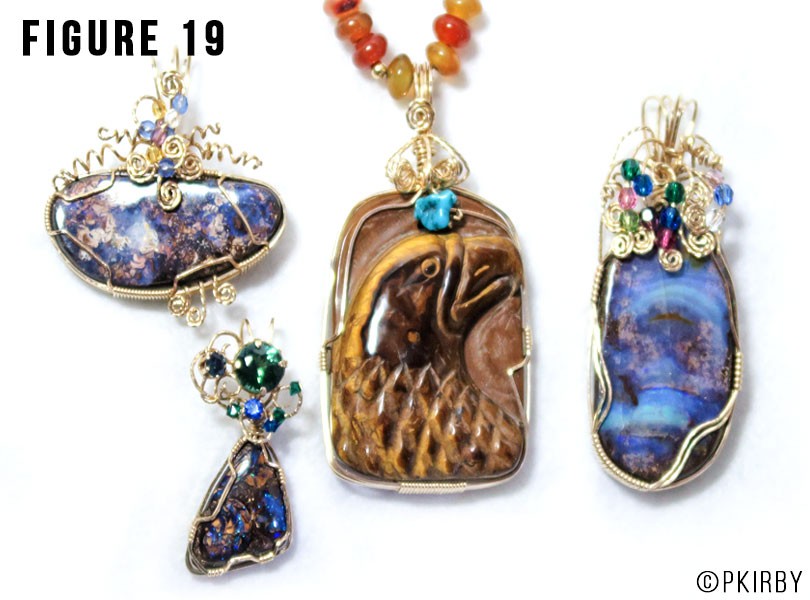
How To Wire Wrap Opals

People from all walks of life are showing a growing interest in creating jewelry by an old art form called wire wrapping. With a lovely stone, wire and fuelled by passion and creativity, this old style uses one’s interest and inspiration to produce an adornment for themselves or another. Seeing the end product of your own creative efforts is incredibly rewarding.
Pamela Kirby, a long time buyer of Opal Auctions, utilized Opals she purchased from our website to wrap the jewelry photographed in this article. Read about the history of wire wrapping and Pamela’s approach and experiences while wrapping these lovely Opals.
Throughout history and with new and better technology, artisans are
using multiple types of media to express their creativity at warp speed. There is more to see,
create and share, and in this dash to acquire and express, there are two themes that continue to be
basic without change; that of giving and receiving. Jewelry’s history became more of a reality as people
used wire to wrap objects of importance, and as a gift of admiration to another. Wire is still being used to fashion adornments of all cultural diversities.

Fig. 1 Wire Wrapped Ring - Coober Pedy White Opal
From any important passage in one’s life, jewelry has and does hold importance to this day. Of the many types of jewelry styles used over the centuries, wire wrapping stands out in significance and popularity.
Native American elders say things that connect an individual with The Great Spirit in a
positive way and are said to have “good medicine”. I hope that the pieces I create have those
qualities, to influence goodness of heart and connection with the creator. My elder Granny said
these things are felt more than seen but are always reflected in what is made.
Fig. 2 & 3 Boulder Opal Two Sided Pendant
My attention to all gemstones began early but Opals are my favorite and my fancy for jewelry goes without saying. It was not until I suffered a stroke that I would become more dedicated to wire wrapping. With a multitude of issues to rehabilitate, eye/hand co-ordination needed more brain work, as I healed. I was embarking on a journey as complex a process as “puzzles”, and often more so.
Mother Theresa once said, “In this life, if we cannot do great things, we can only do small things with great love.” Wire wrapping was to help me heal.
Fig. 4 Mother’s Crystal Opal
I have loved Opals since I was a young one, holding my mother’s Opal pendant and wearing it if I could steal it away from her attention. My elder Granny told me the colors of the Opal dancing within the stone were angels dancing and flying about, practising to be guardian angels for someone, and the colors would never leave the stone as this was a sign to me that the creator loved me and my Angel was watching over me.
Fig. 5 Crystal Opal & Ametrine Pendant
New methods of making jewelry come and go. But strong creative basics in any design or style stand the test of time. Some of today’s designs offer Opals elaborate wires, “weaving” around a solid colored stone and can be seen as presentation of design rather than the stone. This style like many others can be done simply or as elaborate as the designer chooses.
Truly a lovely art form. All are a matter of taste and experience offering many wonderful pieces to own. This offers a “soft” structured Opal protection and directs attention to solid colored Opals.
Fig 6. Opal Ring
Knowing the destination of the Opal is helpful, but not necessary as I wrap the Opal with the story I see on it. I find I use more Opals with design graphics, which have wonderful colors that change direction and concentration on the surface, and thus simplify my designs to show the “story attributes” of the Opal.
Fig. 7 Emeralds, Ethiopian and Fire Opals
Native people often refer to stones as “stone people”, and bring attention to the Opal’s surface designs in story telling, giving placement and help defining the orientation of the Opal in the setting. Opals with multiple colors that shift and “dance” over the surface, draw attention, and coupled with the line directions, the story takes shape.
Fig. 8 & 9 “Traveling Inuit Girl” Boulder Opal, Emeralds, & Peridot Bracelet
I look for “faces” with expressions and often creatures great and small, and most always there is a direction of motion and attention to another point of interest.
Fig. 10 & 11 “Happy Face” Boulder Opal beginning to form pendant with Emeralds and Coober Pedy Opal.
I have brought Opals home without knowing exactly why I was drawn to it. With those, I find myself spending time, what my husband calls, “just staring” at the Opal. I believe every artisan begins their process with personal ways of becoming familiar with the stones and their materials. How I prepare to wrap the Opal is my way of becoming familiar with it and helps me develop a relationship with the stone. Each Opal is taken to an elder and asked for a blessing for the Opal. Believing our purpose on Earth is to honour the creator with our lives, we ask for help showing respect to the Opals and showing its’ brilliance and beauty in the design and work done with the stone. Then, it is time to begin.
Fig. 12,13 &14 Boulder Opal, Black Opal, Black Spinel necklace
It is usually then, I envision the design that will best suit the Opal. Materials are gathered and work is begun. Usually I have seen the “face of the Opal”, but have on occasion, completely finished the process, stepped back and “wow, look at this picture!”. (We all have projects we re-do).
There are a few basics used when preparing my Opal and wire. Researching the science of the Opals’s origin, helps to understand how the Opal is created. Its composition, texture, layering, foundation, working temperatures, how its layers withstand pressure etc. are noted as time is spent evaluation the shape and form, and noting how color dances from it in different light sources.
Fig. 15 Boulder Opal Earrings with Spessartite Garnet, Citrine & Emerald accents
Since the surface is important in any stone work, is the surface one that will accept the pressures and changes of the wire’s shape, surface, and direction. What kind of jewelry do I see it being when finished? Where are the weak points? Do they stay at one spot or travel along, or even through the Opals’s body? Are there inclusions or surface blemishes? Will it require additional support? Straight line, round, twisted wire? Which wire can I use in the Opals’s design to turn the weak points into strong ones?
Fig. 16 Boulder Opal Pendant & Earrings on Koroit Opal necklace
Knowing the properties of wire is absolute. As I study the design, thinking about how the wires’ color reflects upon the surface is an important subtle effect in the design. How the wire responds to bending repeatedly and moving the wire often weakens the wire, or the stone’s surface, especially at changing points, corners and putting accents on or off the wire in delicate or tight places.
Fig. 17 Boulder Opal with Tourmaline accents
As wire is worked into a design, what traction forces or pressure can it withstand to maintain its brilliance? Where is the wire subject to marring? Round wire glides freely if soft, and might need a bit more control if the surface can scratch easily? Where the binding ends, and the wire changes direction, more tension may be added to the surface. Opals can chip or break under a direction change.
Fig. 18 Boulder Opal & handmade “trade” beads
My style of wrapping jewelry is a simple, old one. I use many of the Elder teachings I learned over the years, as a basis to begin the foundation of each piece. Working with stones of any kind is an honour for me each time I am given the opportunity.
Fig. 19 Wire Wrapped Tiger Eye & Boulder Opal
As artisans we all invest personal self into our projects, giving attention to the details and taking time to do our best to make a beautiful design that shows the “Glory of the Stone”. The long hard work done, brings us satisfaction and pleasure at the end, knowing someone will enjoy wearing the jewelry created, and appreciate its’ beauty for years to come.
Fig. 20 Koroit Opal Necklace. Boulder Opal Pendant, Bracelet, Earrings. Coober Pedy Opal Ring.
©PKirby
Shop for Wire Wrap Opal Pendants
Search the Opal Encyclopedia
Related Auctions
Related Articles
With a passion for opals, Wayne and Estella Sedawie established Opal Plus more that 14 years ago and have found the internet to be a valuable tool. It’s where most of the company’s international transactions take place.
17th Oct 2018
The birthstone for October is our favorite gemstone, the Opal. from Black Opals, Mexican Opals and Ethiopian Opals are all as unique as the people born in October
3rd Oct 2019
Latest Articles
An opal’s price comes down to a variety of factors, all of which we’ve broken down in this guide to opal grading and prices. Learn all about opal grading and the prices of each type of opal!
19th Jul 2023
Come on a journey and learn about the healing power of opals from our guest writer Vivien Schapera from Crystal Healing Techniques!
20th May 2023
The Flame (or Fire) Queen opal is the world’s most expensive opal, sold for the modern equivalent of $3 million dollars. Learn all about its history and qualities!
18th Feb 2023
Article Categories
All there is to know about Opals including Black Opals, Ethiopian Opals & Boulder Opal
15 Articles
Check out our fascinating information and articles on all things amazing in the Opal world
43 Articles
Opal Auctions sellers who are approved as opal Verified Sellers
4 Articles

